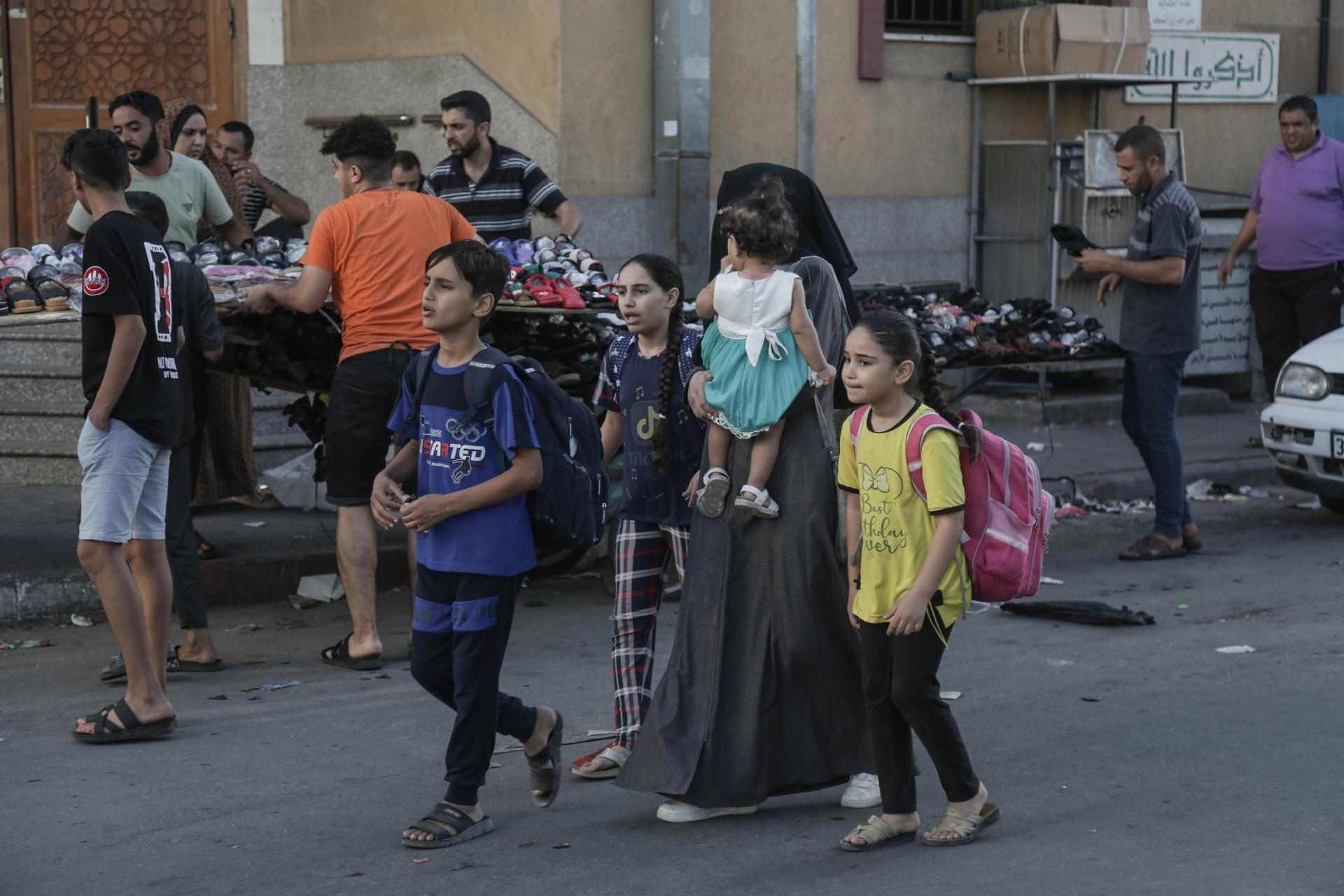The international community has this Friday expressed concern for the safety of civilians in the Gaza Strip in the face of the imminence of a ground incursion by Israeli forces to attack the terrorist group Hamas. Israel has given the population of the north of the territory 24 hours to move to the south, which would involve the movement of more than a million people in just under a day. International organizations such as the United Nations and the World Health Organization (WHO) have responded that complying with this ultimatum is "impossible", while Western countries have defended Israel's right to defend itself against the attack of Hamas.
The UN calls on "all parties" to end the war
The commissioner-general of the United Nations agency for Palestinians refugees (UNRWA), Philippe Lazzarini, asserts that "Gaza is fast becoming a hell hole and is on the brink of collapse" and considers the Israeli ultimatum "horrific". In a statement, he affirmed that this warning from Israel will only "lead to unprecedented levels of misery and push the people of Gaza further into the abyss" when currently "the escalation and speed of the humanitarian crisis is appalling". Therefore, Lazzarini urges "all parties" to "put an end" to the war and provide humanitarian access and protection to civilians.
In this regard, the violation of international law by both sides has been condemned by the UN. "Using the starvation of civilians as a method of war, depriving them of goods indispensable for their survival, is defined as a war crime under international law," said the spokeswoman for the United Nations Office for Human Rights, Ravina Shamdasani, in reference to the total blockade imposed by Israel against Gaza. "Taking hostages and the summary execution of civilians by Gaza, this is obviously also prohibited by international law and are also war crimes," she added.
The West, led by the US and the UK, supports Israel
The West, far from being neutral, has aligned itself with Israel. US defence secretary Lloyd Austin has said that "this is not the time to be neutral" and warned that "everyone who wants lasting peace in the region must condemn and isolate" Hamas. In this regard, he assured that the Pentagon is ready to send more support to Israel if necessary. Meanwhile, the US secretary of state, Antony Blinken, who this Friday met with several Middle East leaders, initially avoided answering whether the US supports the Israeli ultimatum, but later assured that "civilians are not the targets of Israel's operations" but admitted that it is difficult to prevent them from suffering the effects of the attack. However, he blamed the terrorist organization for this possibility to use civilians as "human shields".
UK defence secretary Grant Shapps has been more transparent, directly backing the order to evacuate northern Gaza before going "in pursuit of terrorists". "Israel has the right to defend itself, it has the right to go after Hamas," he said in statements to the media, although he asked that they act in accordance with international law.
The president of the European Commission, Ursula von der Leyen, who travelled to Israel this Friday, has not spoken explicitly about the ultimatum, but she has declared herself convinced that "Israel's response" to the attack by Hamas will "prove that it is a democracy." In addition, she called on Hamas to "immediately release all hostages and completely refrain from taking civilians as human shields". Before these statements, the high representative of the European Union for Foreign Policy, Josep Borrell, had described the ultimatum as "unrealistic", understanding that compliance with it is not possible in such a short time.
Arab countries defend Palestine and demand a solution to the war
The Palestinian president, Mahmud Abbas, met this Friday with Blinken, and warned him that the displacement of the population of the Gaza Strip would mean "a second Nakba", referring to the exodus of hundreds of thousands of Palestinians who fled or were expelled during the conflict that erupted after the creation of the State of Israel in 1948. He also conveyed to him the need to "immediately stop the Israeli aggression", which is causing "a humanitarian catastrophe" in the Gaza Strip. Blinken also met with king Abdullah II of Jordan, who insisted on the need to "open urgent humanitarian corridors" to get aid to Palestine. He also warned about the consequences of adopting a "policy of collective punishment" against the residents of Gaza and demanded respect for international law.
Egypt has also opposed Israel's ultimatum, defining it as a "serious violation of international humanitarian law". On the one hand, it denounced Israel's "intransigence" and demanded that Netanyahu not take "such intense measures", taking into account the pre-existing conditions in the Gaza Strip, which is under a siege that does not allow it to access electricity, food or fuel. As well, he asked the UN Security Council to halt the measure announced by Israel.

